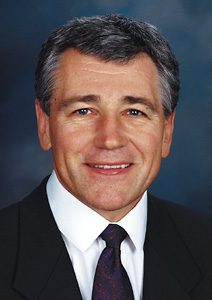Hagel, Charles Timothy (1946-…), served as United States secretary of defense from 2013 to 2015. Prior to taking the post, Hagel had represented Nebraska in the United States Senate from 1997 to 2009. Hagel has also been a decorated soldier and a successful businessman.

Hagel, who is often called Chuck Hagel, was born in North Platte, Nebraska, on Oct. 4, 1946. In 1968, he served in the United States Army infantry in Vietnam. Hagel was wounded twice in combat and received two Purple Heart citations. He earned a bachelor’s degree from the University of Nebraska at Omaha in 1971. He then worked in a variety of business ventures.
In 1982, Hagel entered the cellular phone business. He was cofounder, director, and executive vice president of Vanguard Cellular Systems. In 1990, Hagel served as deputy director and chief executive officer of the Economic Summit of Industrialized Nations, also known as the G-7 Summit.
In 1996, Hagel, a member of the Republican Party, was elected to a seat in the U.S. Senate. As a senator, he became known for his expertise in such areas as foreign relations and international trade. In domestic policy, he supported phasing out the capital gains and estate taxes. He also proposed large budget cuts to federal regulatory agencies. Hagel won reelection to the Senate in 2002. In 2005, he became a vocal critic of President George W. Bush’s handling of the Iraq War (2003-2011). In 2007, Hagel joined Senate Democrats in opposing Bush’s proposal to send additional troops to Iraq. He did not seek reelection to the Senate in 2008. Hagel’s book America: Our Next Chapter: Tough Questions, Straight Answers (2008) discusses his ideas for addressing the nation’s domestic and foreign policy challenges.
After leaving the Senate, Hagel served on the boards of a number of corporations and organizations. He taught courses on foreign policy at Georgetown University. He also became a cochair of President Barack Obama’s Intelligence Advisory Board.
In January 2013, Obama nominated Hagel to succeed Leon Panetta as U.S. secretary of defense. Many of Hagel’s Republican former colleagues in the Senate opposed the nomination based largely on remarks that Hagel had made about the defense budget and Israel and Iran. But the Senate voted to confirm Hagel the following month.
As defense secretary, Hagel faced the challenge of maintaining defense capabilities while dealing with leaner defense budgets. Hagel worked to build an international coalition to fight against militants operating in Iraq and Syria under the name Islamic State (sometimes known by the initials ISIS or ISIL). He also worked with European allies to counter aggressive Russian actions in Ukraine. In November 2014, Hagel announced that he would resign his post as defense secretary once the Senate confirmed a successor. In February 2015, the Senate confirmed Ashton B. Carter to succeed Hagel.
